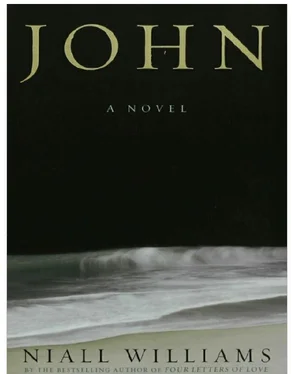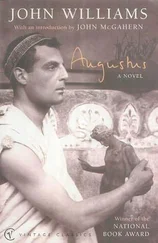'It is her! She lives!' The woman falls prostrate.
Papias runs to the street for help, and then there is a crowd gathered, and with angled poles they pry open the sealed place, and Papias brings forth the living girl.
I thought you came out of the heavens, the earth breaking.
I thought the hour at hand, our waiting over.
What light I saw I went towards. What light was and was the light to ever be now that time was ended.
I thought.
The earth breaking, I fell.
Now do I come to meet you.
I have little breath left in this world.
We prepare the way. Imperfect as we are.
Come, Lord. Come.
In the stillness of the bed where the women attend to him, John remains. He takes but little water. He waits.
Frail and gaunt, he breathes with great gaps between breaths. There are long absences in which Martha fears another breath will not come; then, as if an afterthought, it does. This, the stillness with which he reposes, and his blindness, makes it seem he is elsewhere, or that his spirit comes and goes from his body on airlike wings. When the disciples return each evening, they return with the same face, the same question in their eyes. Martha answers that he is unchanged, and they go to him; he holds out his hands, and they take them and tell of what they have met in the city. They wash and break bread together in the small room and pray thanks.
'Will you teach us, Master?' Papias asks.
'The Master is too weak, he should not,' Danil says.
'Rest yourself, Master,' urges Lemuel. 'There will be time for teaching later, Papias.'
'I am sorry, forgive me.'
But John moves forward to angle himself upright and is assisted then until he is facing them. 'Papias is right. I will teach until the last hour,' he says. 'I will teach of when the Lord knew he was to leave us. When he knew that his hour was come and that he should depart out of this world unto the Father, having loved his own who were in the world, he loved them unto the end.'
He speaks slowly, the words are placed like the timbers of a bridge. He finds each with clear deliberation and tells of the Last Supper. It is plain as he speaks that he speaks toward suffering, that in the telling itself he revisits the very place of which he tells, and is in truth there. He is there as Christ moves amongst them to wash their feet, there as Peter objects and Jesus says, 'If I wash thee not, thou hast no part with me,' and Peter answers, 'Lord, not my feet only, but also my hands and my head.' He is there as his own hands are washed, and he looks down at them, his hands in the hands of Jesus, the water flowing over them and no word spoken. In the telling John is again by Christ's side at the table. And so, too, then, are those who listen.
The voice of the Apostle is quiet, barely more than a whisper. The room is small, and in it the disciples and the two women do not move. Night is fallen outside as it is in the telling when Judas leaves the table and goes out, and John says Jesus told, 'Now is the Son of Man glorified, and God is glorified in him.'John says this so quietly, it seems he might say no more. In the pause is love and loss absolute. In the movement of his throat is swallowed grief. His blind eyes pulse. It is clear to all the spirit pain he encounters, how near the telling brings him, and yet, at the end of some phrases, a pause in the account, and his body reminds him how far.
He regains minor strength, tells until he falters again to say, on the edge of the audible, 'Jesus told, "In my Father's house are many mansions; if it were not so, I would have told you. I go to prepare a place for you. And if I go and prepare a place for you, I will come again, and receive you unto myself." '
Again he pauses. His chin trembles. Immensely he struggles to speak. His tongue wets his lower lip.
They should tell him to rest himself, that they will leave him to rest now, but they are afraid of what feeling seems to course through him now. They are afraid this may be the last time. Every utterance is at the point of revelation.
' "And if I go",'John says again, very faintly. ' "And if I go and prepare a place for you, I will come again and receive you unto myself. There where I am, there may you be also." '
He stops. He lets his head rest back.
Silence falls.
The day following, Papias comes to the Apostle before he is to go about in the city. He comes to seek blessing only, but John seems to him stronger than the night before, and he cannot keep himself from asking.
'Master, what you teach. .'
'Yes, Papias?'
'I would record it in scripture. I have not the hand of Prochorus but would endeavour well. I would make faithful copy.'
'What I teach you teach,'John says. 'You are the scripture living. There is no need.'
'But I am imperfect, Master, and forget and would have it written that. .'
'There is no need, Papias,'John says with surprising force, then is quieted to say, 'We are in the last time. There are many Antichrists, are there not?'
'There are.'
'So it was written. So we know it is the last time. So we know he comes. We will be living scriptures to the end. It will suffice.'
Papias presses no more. He goes into the city as before. In the aftertime of the earthquake have come into Ephesus the soothsayers, fortune-tellers, dealers in tokens to dispel disaster and bring back the dead. Out of desert, mountain, and plain have come bearded nomads bearing potions, scrolls, effigies, bones, the skulls of creatures slain by lightning, such things. They trade on the fear of survivors. They broadcast fevered interpretations of the gods' displeasure and how favour is to be regained. Crowds flock to them. The city streets fill with flushed faces. Homewards hurry those who have bargained new immunity, while others rush out afraid they are too late. It is a city aswarm with prophets. Some speak in tongues urgent and profound and untranslatable; others quote scriptures of sages unknown, figures from distant lands who scribed the secret mysteries of the world. Fair copies can be purchased at good price, bargains all. Protect yourself with the holy words.
Papias hastens on. He is travelling down a shaded street to call on the mother whose daughter he rescued when a figure steps into his way. He does not recognise Auster at first.
'Papias!' The voice is a hoarse whisper, with shaven head, the face a moon. 'It is I, Auster.' He waits a moment as if to allow the other to consider the glory of himself. 'The One would speak to you.'
'The One?'
'He would speak with you. He sent me to bring you.'
The One? There is a chill in hearing it. 'Go from me,' Papias says. 'Tell him I would not go. Tell him I would not speak with him ever.'
'You will want to speak with him. You will want to come.'
'Go from me. I have urgent business.'
'The woman will wait.'
'What woman? What do you speak?'
'I know. I know all you know and do. I say again, come, follow me, friend.'
'I have nothing to say to Matthias.'
'But he has much to say to you. Come.'
'I will not. Go, be gone from me. You are an Antichrist.'
Auster smiles. 'O how you sting. You are in the dark, friend. I know. I have come from that dark. You live a lie.'
'I do not. I am in the light of Jesus Christ, who comes again. The hour is at hand. Be gone from me.'
Auster is unchanged. He stares from within a studied calm. He says, 'He would speak with you, you must come. You will come. For he will show you proof your life is a lie. He will show you proof because yet you may be saved, and he has decreed it so that you be offered this chance. You he elects. You will come. It will be revealed to you. Friend, he will show you proof that you follow a fool, proof that your John is not John.'
Читать дальше










